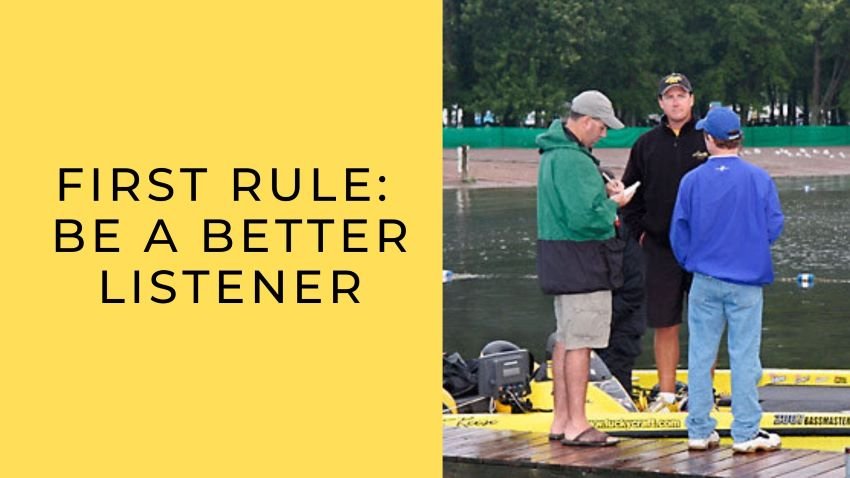My Most Difficult Lesson as a Fishing Writer
“We have two ears and one mouth so that we can listen twice as much as we speak.”
I am an interrupter.
I come from a family of interrupters.
It was all I ever knew, and even as I’ve come to recognize that, I see that the world is full of people like us. I’m on Zoom and Teams calls all week long where I know that in order to be heard I have to blurt out as much as possible as quickly as possible or else I may never get another chance to speak.
This background worked to my detriment early in my writing career. Occasionally it still does. I was often so dead set on getting to the next question (and, as an introvert, getting off the phone or otherwise ending the interview) that I’d cut people off. Regularly. Frequently. I rarely got the full benefit of my interviewees’ insights because I was rushing them. They’d get out the basic answer and rather than taking a deep breath and waiting for the more nuanced answer, I’d take their brief pause as a sign to move on. It resulted in articles that were not as good as they should have been.
What I’ve Learned to Do
I don’t fault myself for being a recovering interrupter. As noted above, it’s the environment that molded me. Besides, I don’t have any formal journalism training. Never worked on a school newspaper, never took any courses in the topic. I lucked into my writing gig. A quick online search shows that there are all sorts of formal and informal interviewing classes available, both in-person and online, including from renowned journalists, but if I’m telling the truth about myself I highly doubt that I’ll ever take any of them.
Nevertheless, I work every day to try to get better at this. I realize that “garbage in, garbage out” is cliched because it holds some truth. If your interview subjects don’t give you meaningful material to work with, you can’t build a solid finished product. With that in mind, here are some of the lessons that I remind myself of before every effort:
Be prepared – Have you ever listened to Howard Stern, who has morphed from pure shock jock to incredible interviewer? Just about once a show, he’ll bring up an anecdote or fact about a guest that the guest has no idea is public. It opens them up. It shows that he’s done his research. Of course, he has a team to help him, but just because you don’t doesn’t excuse you. If, for example, you’re interviewing Brandon Palaniuk about an upcoming tournament, you should know how he’s done at similar times of year, on similar bodies of water (or the same one). There’s enough information out there that you should have some insight into your subjects’ beliefs and feelings. An egregious factual error undermines their perception of your competency.
Don’t prewrite the article – This is one I was guilty of early in my career, and I still sometimes fall into the trap. I come to the article with it effectively already written, seeking only to fill in a few details. For example I might presume, “Kevin VanDam hasn’t won a Classic since 2011 and he wants one more title before he retires.” Then, no matter what he says, I interpret it to reflect that narrative. That’s lazy and uninteresting. Maybe he doesn’t give a damn about another title (kind of doubt it, but willing to countenance the idea). Some of my favorite pieces I’ve read and written take an unexpected turn.
No “Yes or No” questions – Pretty self-explanatory but you’re rarely going to get a meaningful quotation from asking a “Yes or No” question. If you fall into this trap, and I regularly do so myself, at least ask the follow up of “How?” or “Why?”
Listen…Really Listen – Pace yourself. Don’t be thinking about your next question when your interviewee is just starting his or her answer. Really focus on their words, what they mean, what message they’re sending you with their answer. Otherwise, you’ll miss cues. Be empathetic and engaged.
Ask the follow-up question – Once you’ve listened carefully and thoughtfully, if you’re still not sure that you’ve gotten a decent answer, or any answer at all, and there’s still meat on the bone, ask again, in a different way. Ask them what they meant by a certain word or a certain phrase. Sometimes the clarification becomes the answer, sometimes it undermines the answer and leads to a different conclusion or suspicion.
Ask for clarification – Yes, the last bullet point instructed you to ask for clarification in the form of a follow-up, but sometimes the terms themselves require that you get a better understanding of what they meant. The same word might mean different things to different people, especially if there are regional or cultural gaps. You don’t want to assume they meant X, when they actually meant Y, or even the opposite of X.
Build trust to question effectively – In most cases, you cannot go into an interview with someone you don’t know, and who doesn’t know you, and start asking the hard shit, about really thorny issues, right off the bat. Not only are they unlikely to answer honestly, if at all, but they’re going to be more guarded about even less difficult issues. You don’t earn the right to ask those questions until you are Bob Woodward, Wright Thompson or Jeff Pearlman. At the same time, there are ways to make your subject matter more comfortable. Choose your words carefully: “I understand this is difficult, but…” or “Just to make sure that I understand…” or “Help me tell your story in the most complete way possible…” Some might call them “weasel words” but I think it’s a way of showing humanity and getting better results.
Be willing to go off the record – It’s important to be able to ask “Are you sure you want to be quoted on this matter?” or otherwise indicate that a topic is “off the record.” Once they indicate such, it stays locked up. Not in your article, not on your blog, not on your social media, not to your friends. Again, I’m not a capital-J-journalist. I write about fishing. I’m not looking for gotcha type questions or investigatory glory. Either way, off the record means off the record.
Ask the hard question – When you’ve gotten an answer, and you’re not satisfied with it, or you think there’s more to be had, after listening, pausing and digesting, take it at least one step further. There’s nothing wrong with being a little bit uncomfortable in this circumstance, but be sure to ask.
Ask the oddball question – In addition to the hard questions, have a few odd ones up your sleeve. This can disarm your subject, make it more fun, and lead you down paths that you never imagined would happen. Even if it’s not for this article, it might provide the genesis of another piece. It’s possible to be fun and lighthearted without being goofy.
Ask “What did I fail to ask?” – I just about always ask this question at the end of an interview. Typically, they want to escape, and they won’t offer anything, but every once in a while, there’s some nugget, something that’s been sticking in their craw, or even an idea for another piece, that turns out to be pure gold. Don’t always assume that you have the full list of questions in front of you.
A Meaningful Corollary to the “Don’t Interrupt” Rule
After making a big deal about not interrupting, above, I do feel that I need to qualify that a little bit. The fishing world, like much of the rest of the world, has more than its share of unfocused people with diarrhea of the mouth. There are times where if you don’t cut someone off – and, more meaningfully, redirect them back to your topic – you won’t get what you need no matter how long you’re in conversation masquerading as a monologue.
With these people, you need to find a way to keep them on track, or at least close to the track. If you’re writing an article about how to catch fish on a vibrating jig in grass and they’re talking about their Rottweiler puppy that died in 1985, you’re wasting time. Even if you have all the time in the world to give, eventually these other people will run out of time, or energy, or they’ll get distracted, and suddenly they’re gone. Each heavy talker has their own rhythm, their own attention span, and their own self-awareness. It’s a learning process each time. I know that there are certain people whose names show up on Caller ID and I cringe (or perhaps even curl up into a fetal position before redialing) but at some point you have to deal with them – learn to get the most out of the experience.







